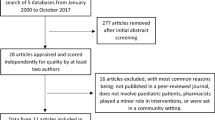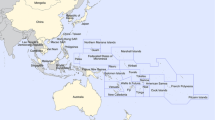Abstract
Objectives
The purpose of this study was to, first, investigate the perceptions of neonatal intensive care unit (NICU) pharmacists and directors of pharmacy in Australia and Poland regarding their level of preparation to perform pharmaceutical care services in the NICU, and second, identify practice barriers and ways to improve services.
Method
A cross-sectional, electronic-based survey was distributed among NICU pharmacists and directors of pharmacy working in hospitals with a NICU in Australia and Poland. The survey comprised 12 items, and the majority of questions were fixed binary ‘agree/disagree’ answers, supplemented by open-ended questions.
Results
A total of 29 participants from Australia and 20 from Poland completed the survey. Overall, it is apparent that Australian pharmacists felt more competent in clinical and educational roles than Polish participants. For 14 of the 15 clinical roles listed, more than 70% of Australian participants felt that pharmacists had a ‘good’ level of preparation to provide services to the NICU, including performing medication chart reviews (93.1%) and pharmaceutical interventions (96.6%), and collaborating with medical and nursing staff (93.1%). A significantly higher proportion of Polish than Australian pharmacists agreed that changes were needed to improve pharmacist practice in the NICU (90 vs. 53.6%; p = 0.007).
Conclusion
Future efforts should focus on developing guidelines and practice standards for sub-specialties of pharmacist practice, such as neonatology, to promote the standardization of practice.
Similar content being viewed by others
References
Krzyzaniak N, Bajorek B. A global perspective of the roles of the pharmacist in the NICU. Int J Pharm Pract. 2017;25(2):107–20.
Kaushal R, Bates DW, Landrigan C, et al. Medication errors and adverse drug events in pediatric inpatients. JAMA. 2001;285(16):2114–20.
Krzyżaniak N, Pawłowska I, Bajorek B. Review of drug utilization patterns in NICUs worldwide. J Clin Pharm Ther. 2016;41(6):612–20.
Krzyzaniak N, Bajorek B. Quality use of medicines in neonatal care: a review of measures of quality used to evaluate the appropriateness and rational use of medication within the NICU. Drugs Ther Perspect. 2016;32(9):392–402.
WHO. Rio Political Declaration on Social Determinants of Health. World Conference on Social Determinants of Health Rio De Janeiro: WHO; 2011.
Doloresco F, Vermeulen LC. Global survey of hospital pharmacy practice. Am J Health Syst Pharm. 2009;66(3):S13–9.
Pawłowska I, Pawłowski L, Kocić I, et al. Clinical and conventional pharmacy services in Polish hospitals: a national survey. Int J Clin Pharm. 2016;38(2):271–9.
Pawłowska I, Kocić I. Rational use of medicines in the hospitals of Poland: role of the pharmacists. EJHP-SP. 2014;. https://doi.org/10.1136/ejhpharm-2013-000393.
Dunkley M. Neonatal intensive care: an Australian survey of the pharmacist’s role. Aust J Hosp Pharm. 1991;21(2):104–8.
Swieczkowski D, Merks P, Jaguszewski M, et al. Pharmaceutical care in opinion of Polish medical and pharmaceutical students: an exploratory study. Act Pol Pharm Drug Res. 2017;74(3):1021–30.
Barker M, Fejzic J, Mak AS. Simulated learning for generic communication competency development: a case study of Australian post-graduate pharmacy students. High Educ Res Develop. 2018;37(6):1109–23.
Haggan M. PharmG game creates a simulated pharmacy. Aust J Pharm. 2016. https://ajp.com.au/news/pharmg-game-creates-simulated-pharmacy/. Accessed 7 Aug 2018.
Mellor R, Cottrell N, Moran M. “Just working in a team was a great experience…” : student perspectives on the learning experiences of an interprofessional education program. J Interprof Care. 2013;27(4):292–7.
Krzyżaniak N, Pawłowska I, Bajorek B. The role of the clinical pharmacist in the NICU: a cross-sectional survey of Australian and Polish pharmacy practice. Eur J Hosp Pharm. 2018;25(e1). https://doi.org/10.1136/ejhpharm-2017-001432.
Erickson AK. Neonatal pharmacist to the rescue: caring for the hospital’s most vulnerable patients. American Pharmacists Association. 2015. http://www.pharmacist.com/neonatal-pharmacist-rescue-caring-hospital-s-most-vulnerable-patients. Accessed 21 July 2016.
Katoue MG, Awad AI, Schwinghammer TL, et al. Pharmaceutical care in Kuwait: hospital pharmacists’ perspectives. Int J Clin Pharm. 2014;36(6):1170–8.
Krzyżaniak N, Pawłowska I, Bajorek B. The role of the clinical pharmacist in the NICU: a cross-sectional survey of Australian and Polish pharmacy practice. Eur J Hosp Pharm. 2018;25.e1:e7–e16.
Krzyżaniak N, Pawłowska I, Bajorek B. Pharmacist perceptions on the need for a quality guidance resource for pharmacy service provision in the neonatal intensive care unit: comparison between Poland and Australia. J Pharm Health Serv Res. 2018;9(3):245–57.
Rio Political Declaration on Social Determinants of Health. Rio De Janeiro: World Conference on Social Determinants of Health; 2011.
O’Leary KM, Allinson YM. Pharmacy clinical and distribution service delivery models in Australian public hospitals. J Pharm Pract Res. 2004;34(2):114–21.
Thomas DR. A general inductive approach for qualitative data analysis. Am J Eval. 2006;27(2):237–46.
Braun V, Clarke V. Using thematic analysis in psychology. Qual Res Psychol. 2006;3(2):77–101.
Gilbar P, Stefaniuk K. The role of the pharmacist in palliative care: results of a survey conducted in Australia and Canada. J Palliative Care. 2002;18(4):287.
O’Leary KM, Allinson YM. Snapshot of the Australian public hospital pharmacy workforce in 2007. J Pharm Pract Res. 2009;39(1):28–33.
Cordina M, Safta V, Ciobanu A, et al. An assessment of community pharmacists’ attitudes towards professional practice in the Republic of Moldova. Pharm Pract. 2008;6(1):1–8.
Piecuch A, Pawłowicz P, Kozłowska-Wojciechowska M, Waniewski S, Makarewicz-Wujec M. Can inter-faculty relationships improve future collaboration between physicians and community pharmacists in Poland? J Interprof Care. 2014;28(6):579–81. https://doi.org/10.3109/13561820.2014.917405.
Joint FIP/WHO guidelines on good pharmacy practice. standards for quality of pharmacy services. Geneva: World Health Organization; 2011.
World Health Organisation. Health Systems—Equity. 2017. http://www.who.int/healthsystems/topics/equity/en/. Accessed 05 Oct 2017.
Final Basel Statements FIP Global Conference on the Future of Hospital Pharmacy. Basel: International Pharmaceutical Federation; 2008.
Paola S. Specialty support for hospital pharmacists. Aust J Pharm. 2017. https://ajp.com.au/news/specialty-support-hospital-pharmacists/. Accessed 05 Oct 2017.
Acknowledgements
The authors thank all of the pharmacists and directors of pharmacy in hospitals in Australia and Poland for their invaluable assistance and cooperation.
Author information
Authors and Affiliations
Corresponding author
Ethics declarations
Ethical approval
Ethics approval was obtained from the ethics committees at the University of Technology Sydney, Australia (ref no. ETH16-1033) and the Medical University of Gdansk, Poland (ref no. NKBBN/424/2016).
Conflict of interest
The authors have no conflicts of interest.
Funding
This research received no specific grant from any funding agency in the public, commercial, or not-for-profit sectors.
Rights and permissions
About this article
Cite this article
Krzyżaniak, N., Pawłowska, I. & Bajorek, B. Pharmacist perspectives towards pharmaceutical care services in neonatal intensive care units in Australia and Poland. Drugs Ther Perspect 34, 573–582 (2018). https://doi.org/10.1007/s40267-018-0556-5
Published:
Issue Date:
DOI: https://doi.org/10.1007/s40267-018-0556-5




